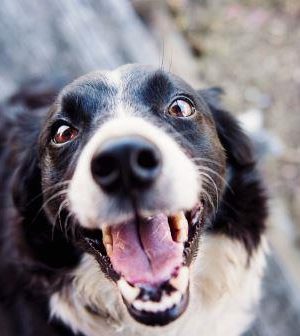- Do you subscribe to Dharma Dog Training’s Newsletter? You should.
- A Unique Campaign from The Humane Society of the United States
- Rabid bats in Omaha- Stay safe, prepared with these tips
- Springtime Activities in Omaha
- Mill Dog Monthly from Bailing Out Benji
- World Spay Day, Legislative Alert in Nebraska
- Attend the Nebraska Rescue Council’s monthly meeting this Saturday
- Five Hard-to-Ignore Reasons to Adopt!
- Paws in Pink to Benefit Breast Cancer Foundation
- VCA, Inc. Acquires MidWest Vet Specialists from Kansas State University
Different Dog Personalities and How to Best Train Them

Lots of people assume that a dog is a dog. They may have slightly different personalities, but all dogs will respond to the same training. And some people don’t even realize that dogs HAVE different personalities.
With dogs, genetics of course play a huge part in determining dog personality, as well as how they are raised (the classic nature vs. nurture argument). But even from puppyhood, dogs will show signs of their blossoming personality type. And research has revealed that there are five distinct personality types among dogs.
Different breeds tend heavily towards different personalities, but dogs are individuals. Some may be a combination of different personalities, but one will likely be more dominant than others.
Knowing the personality of your dog will make developing a training method for him or her much simpler. Is your dog easier to please or more independent? The same training won’t work for both dog personalities.
If you are feeling a bit lost on where to start training your dog, we’ve compiled a handy guide for the five dog personality types, and training tips for each one. If you want to build a stronger bond with your four-legged friend, read on!
1. The Independent Thinker
Let’s start with probably the hardest dog personality to train. These dogs are probably not going to be hanging on your every word. They prefer to do things their own way and work independently.
Breeds that tend towards this dog personality include sledding breeds such as Huskies, “cat-like” dogs such as Akitas and Shiba Inus, and sighthounds like Greyhounds.
These dogs will need a high degree of motivation and leadership to teach them obedience and other commands. If they perceive you as the type to roll over or get frustrated, they will run all over you.
Work on establishing good engagement from puppyhood and on constantly mentally challenging them. Pure physical exhaustion will not make them a happy and balanced dog; their brains need to be engaged in order to be happy.
Think of these guys like an extremely gifted student; if they aren’t challenged appropriately and constantly, they may act out and rebel.
2. The Sensitive One
This dog personality is keyed into every sound, movement, and breath that you make. They also might tend towards skittishness or shyness when faced with new situations.
The key to developing good training habits with this dog type is to socialize early and often. While all dogs need lots of socialization from puppyhood, sensitive dogs have a higher tendency to become fear-aggressive or reactive if not properly socialized.
And socialization isn’t just letting them meet other dogs and people. It’s all about putting them in safe, controlled new environments and situations. Taking them to new places and giving them as many new sights and sounds as possible is key.
When training this dog personality type, use a gentle touch and lots of positive reinforcement. Stay calm and quiet and be confident and firm. Don’t put them in a situation that is overwhelming; build up exposure slowly.
Breeds that tend towards this personality type include Border Collies, German Shepherds, and other working and herding breeds.
3. The Happy-Go-Lucky
These dogs are the loveable goofballs that seem to not be phased by anything that comes their way. They love other people, love other dogs, and love anything they see or experience.
This is usually a plus, as these dogs are very easy to live with and often make good “first dogs” for new owners. On the downside, they tend to be so easily distracted by everything new and wonderful that they are difficult to keep focused during training.
Keep training short and simple to accommodate those short attention spans. You might have to repeat things constantly until they get it. Find out what really drives these types of dogs (food? toys?) and reward it liberally.
Make sure to enforce boundaries and manners from a very early age. No one likes a bounding Labrador jumping on everyone at the backyard barbecue. Labs and Golden Retrievers are the dog stereotypes for this personality.
4. The Confident One
You can just tell these dogs by the swagger in their walk. They know what they are and they know they are in charge.
This can make them very difficult to train. It takes a very strong leader to temper the dominance of these dog personalities, but once they respect you, the bond is very strong.
Contrary to prevailing belief, these types of dogs do not respond well to harsh and negative punishment to “establish dominance.” Rather, building respect through positive reinforcement and good engagement skills is key.
Be warned that these dogs will constantly challenge you and your training and push their boundaries. Stay consistent and firm without getting angry or frustrated.
Breeds that tend towards this dog personality type include Presa Canarios, Rottweilers, and other guard dog breeds.
If you are interested in bringing a breed like the Presa Canario into your home, make sure to look into the cost of a Presa Canario and factor that into your budget along with training costs and supplies.
5. The Problem Solver
This is the dog personality that excels at solving problems, for better or for worse. They need constant mental engagement and challenge in order to stay happy.
If these dogs are not kept stimulated and happy, they will often find a problem for them to solve, and it will probably be your choice in flooring or interior decor.
These dogs will constantly be looking for ways to outsmart you and take advantage of you. Be extremely firm with your boundaries and expectations from day one. Challenge them in training by building into things such as scent work or puzzles.
Breeds of this dog personality type include Belgian Malinois and other working breeds, especially herding breeds.
No Matter What Dog Personality Your Dog Has…
Remember that every dog will benefit from constant training, as well as physical and mental stimulation. Socialization of every breed from puppyhood is crucial to well-adjusted and resilient dogs, regardless of the dog personality.
Latest News
-
3 Tips for Pet Owners on Training Rescue Dogs
Owning a rescue dog can take some work compared to...
- Posted 1 week ago
- 0
-
Choosing the Right Pet for Your Lifestyle
Are you thinking about getting a pet but unsure what...
- Posted 3 weeks ago
- 0
-
How to Make Your Rescue Pet as Comfortable as Possible
Did you bring home a new pet from a shelter...
- Posted 1 month ago
- 0
-
How Having A Pet Can Change Your Life
Having a pet can open your heart in ways that...
- Posted 7 months ago
- 0
-
How To Improve The Life Of Your Senior Pet
Do you have an elderly fur baby and want to...
- Posted 7 months ago
- 0
-
Springtime Activities To Enjoy With Your Furry Friends
Are you preparing for warmer weather and want some ideas...
- Posted 8 months ago
- 0
-
Pros And Cons Of Microchipping Your Pets
Have you considered whether your pets should be microchipped and...
- Posted 9 months ago
- 0


















You must be logged in to post a comment Login